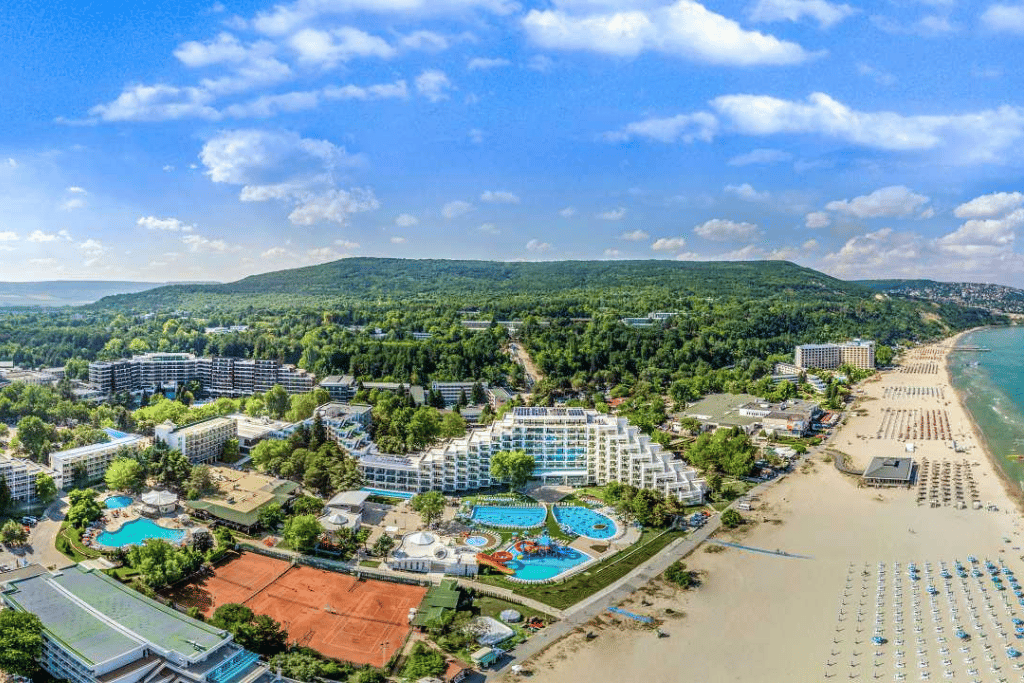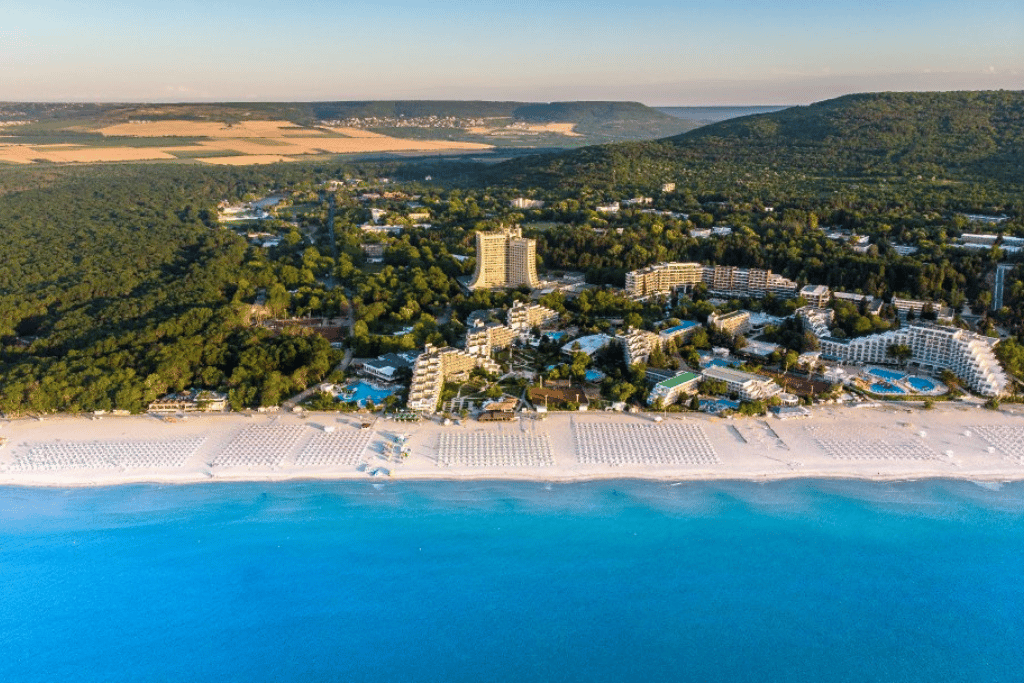GREEN HOTELS
The editorial board of Kongres Magazine has been closely following and analysing various sustainability marketing campaigns. It seems their numbers have skyrocketed this year. As it turns out, many of them are misleading and purposefully used by greenwashers to increase sales or improve a company’s reputation. By doing so, they deceive well-intentional consumers and, ultimately, do not contribute to solving ecological and social issues. It is vital to stay aware of the ways in which they attempt to outwit us. Recognising greenwashing is how we can reduce its influence on our choices.
We have decided to prepare a series of articles that will uncover such practices and, hopefully, contribute to a more responsible meetings industry.

Case 7: FROM WORDS TO GREEN ACTIONS
Type of greenwashing: A combination of all sorts of greenwashing
The hotel industry must take on responsibility for its harmful environmental effects. In whatever way we see it, tourism accounts for nearly 10% of greenhouse gas emissions, and hotels play a pivotal role. The corona crisis has showcased how blurry our memory is. We forgot everything the past two years supposedly taught us. Considering the corona equation and the rising fuel prices, lack of water, the dwindling biodiversity, not to mention the inadequate wages and lack of human rights of employees in the tourist industry, we can expect a storm that we must confront immediately. Those attempting to do so correctly will see progress, while others will fail. As the consequences of climate change and irresponsible behaviour have visible negative effects, the image is becoming perpetually clearer.
Despite ongoing turmoil, responses by hoteliers are still predominately marketing-focused. Marketing is the most exploited area of greenwashing. Most commonly, hotels use poorly-substantiated claims without any basis. Sometimes, they refer to certificates of suspicious origin. Alternatively, they emphasise the lesser evil or refer to offsetting. On occasions, it is a combination of several misleading practices.
It is vital to acknowledge that sustainable tourism principles can, likewise, be implemented in mass tourism. Too often, this concept is mistaken for boutique tourism. Thus, we have another reason to overview companies that have started to reduce their costs while building their esteem and increasing their market value by implementing sustainable principles.

I have convinced myself of this in an unlikely place, Bulgaria, where I least expected it. The country’s most famous resort destination, Albena, next to the Black Sea, was envisaged as a socialist, tourist and urbanist experiment. In those times, delegations flocked to Albena to see the resort. The resort made it through the transition in one piece and has altered itself into one of the greenest resorts in Europe. A socialist utopia became a platform for testing new green technologies, innovations and principles, thus showing the green future of mass tourism.

The resort is extraordinary on a European scale and was crowned with ISO 9001 and ISO 14001 certificates. In addition, their aspirations resulted in numerous awards and certificates, including the Green Oscar, Travellife, and ESPA Innovation Award. A purposefully appointed representative focuses only on quality, while all key stakeholders are involved in these activities.
Nonetheless, nothing is perfect, not even in paradise. As a relict of long-gone times, stands boasting kitsch and plastic are scattered throughout the resort. They can be perceived as the resort’s additional offer or unnecessary clutter. I do not doubt the resort will look even more exclusive and better without it. In my opinion, such plastic disorders should be immediately banned and driven away from the streets of Albena. I can almost imagine what Albena would look like without plastic.
In any case, I can confirm that Albena is endeavouring to develop sustainable tourism, respecting the needs of the environment, local inhabitants, economy and visitors – for today and tomorrow.
I hope hoteliers globally start aspiring for quality and not just quantity.
Note: You are invited to send us your suggestions and good and bad practice cases. We will share them with colleagues within the meetings industry. Together, we can achieve more.

Environmentalist Jay Westerveld coined the term “greenwashing” in 1986. While on an expedition to Samoa, he was greatly upset by the hotel sign concerning the reuse of towels. He concluded that its purpose was solely a strategy to lower expenses instead of the hotel’s sustainable and responsible aspirations.
Westerveld was the first to use the term greenwashing in his expert article, and the rest is history. The term has survived till today and encompasses all areas of sustainability, including gender equality, poverty, hunger, health, education, paid work etc.
There are several typical examples of greenwashing. They have been around for some time, yet, we continue to be duped by them. We have summarised the most typical examples of greenwashing below:
1. Presenting information selectively
An example of greenwashing is emphasising environment-friendly information whilst withholding negative information. A typical example is ignoring the carbon footprint of event transfers which can amount to 75% of an event’s entire carbon footprint.
2. Lack of proof to back up claims
Let us suppose a company claims their event is green or eco-friendly but does not enclose any concrete proof. They should at least calculate their event’s carbon footprint and support it with a certificate issued by an official institution.
3. Ambiguity and vagueness of claims
Another way of misleading is using loose and undefined terms that are nearly impossible to understand in one way. A recurring example, for instance, is stating that an event is carbon-neutral without elaborating what that stands for.
4. Deceiving and irrelevant labels
Companies will often refer to certificates and labels that, in fact, do not exist or are misleading. Lately, there have been cases of green venue finders with no real foundation. This type of deception is embodied by companies that sell “products without CFC”, even though chlorofluorocarbons are forbidden by law.
5. Highlighting the lesser evil
Event organising is environmentally unfriendly. Hence, the claim that one event is greener than another is plainly false.
6. Selling lies
On occasions, companies choose to proclaim lies. Making false claims, certificates, and inventing facts will mislead customers.
7. Meaningless labels
Certificates, labels and awards can often have little or no meaning. In some cases, organisations even award themselves with certificates or endorsements not backed by any authority.
There are even cases when companies tell outright lies. Sooner or later, such practices are exposed, and information about them spreads like wildfire.
In Britain, the Advertising Standards Authority (ASA) is reporting a boom in the number of complaints about environmental claims – up from 117 in 2006 to 561 last year. “What we are seeing is claims about being carbon-neutral, zero-carbon emissions and use of words such as sustainable and organic,” says Lord Smith, chairman of the ASA.
About the author
Gorazd Čad is a seasoned meeting planner who has dedicated 25 years of his life to the meetings and events industry. He witnessed the fall of Yugoslavia, the establishment of independent Slovenia, adapted to the internet revolution of the ’90s, overcame the economic crisis of 2008, the 2010 eruption of an Icelandic volcano, and the 2019 meetings industry burnout, 2020’s corona crisis and more. Among other things, Gorazd Čad is a professor of geography and history who is sincerely worried about the planet’s future. He strives for events that will be environmentally friendly and responsible to attendees and society.
Slovenian Advertising Code on greenwashing
What the Slovenian Advertising Code says about greenwashing:
Article 17: ENVIRONMENTAL ARGUMENTATION
17.1
Advertising that includes environmental argumentation should be presented in a manner that does not exploit the consumer’s environmental concern or his potential lack of knowledge about environmental themes. It should not contain claims or visual representations that could, in any way, mislead the consumers about products’ benefits from an environmental viewpoint or the environmental activities the advertiser will conduct. Messages can apply to concrete products or activities; they cannot, however, unjustifiably imply that they cover all activities of a company, group or sector.
17.2
Claims concerning environmental preservation are not allowed to be used groundlessly. Claims such as environment-friendly, completely biodegradable, greener, friendlier or organic may be acceptable, provided the advertisers prove their truthfulness.
17.3
Comparisons are acceptable if the advertisers can prove that their product improves from an environmental perspective compared to their own or competitors’ products.
17.4
Claims and comparisons can be misleading if they leave out important information.
17.5
When scientific opinions are divided, and the results are not final, the advertisement has to make that clear. An advertiser cannot quote that their claim is generally accepted if that is not the case.
17.6
In case a product never had any evidently harmful effects on the environment, the advertisement cannot suggest that its structure was altered to make it more environment-friendly. It is, however, lawful to quote claims about a product whose composition has been altered or has been used hitherto without ingredients that are known to be harmful to the environment.
17.7
The use of lesser-known expert terms should be avoided. If the use of a scientific term is unavoidable, its meaning should be clear and understandable or additionally explained.
17.8
A broader explanation of the most commonly used claims and terms is defined in the International Chamber of Commerce Code of Advertising and Marketing Practices.
For more information please check: https://iccwbo.org/content/uploads/sites/3/2018/09/icc-advertising-and-marketing-communications-code-int.pdf.














